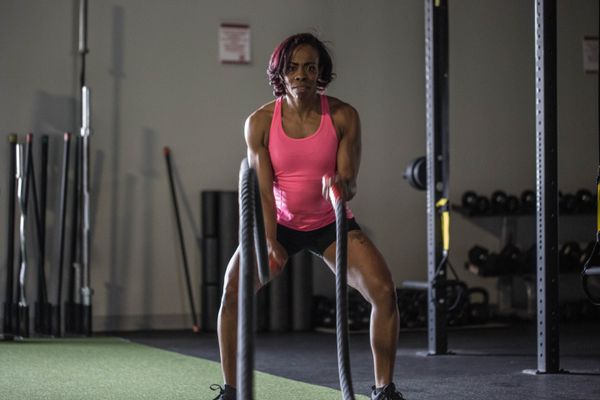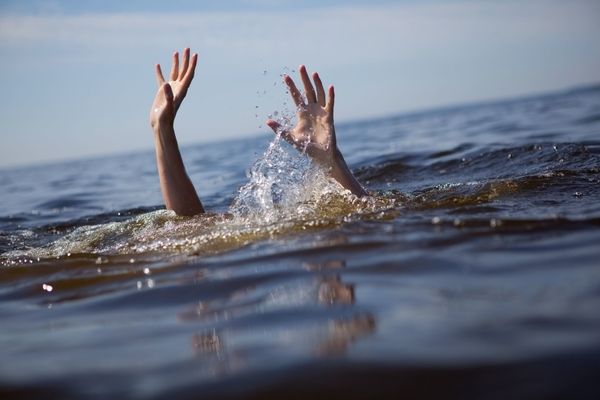It seems like the only thing I do these days is scroll through social media in a desperate attempt to gain information. My phone has called me out on my screen time more than once, and I just continue to ignore it. You're probably in the same boat — stuck at home, scrolling deeper and deeper into a hole of conspiracy theories and possible "back to normalcy" dates, hungry for information.
While we know that the news is not our mental health's friend these days, getting reliable information is helpful and necessary.
While the rest of us are home on our phones, healthcare workers are on the coronavirus (COVID-19) front line every single day. They see what we read snippets of, quickly gaining the perspective that we couldn't fathom. That's why we're going to the root of the information — these healthcare workers who put their own safety at risk every single day.
Today, I sat down (virtually) with Blakelynn Sherouse, a labor and delivery nurse in Ridgecrest, California.
How long have you been a nurse?
I've been a nurse for two and a half years.
What department do you work in?
I work in a combined labor and delivery/postpartum unit, but we also see plenty of pediatric patients.
What is your hospital's procedure in regard to COVID-19 patient care?
Currently, we are screening all patients, visitors, and staff for signs of infection and exposure, from the time they enter the premises. Everyone has their temperature taken and is asked a variety of questions based on possible symptoms and exposure to those testing positive. We have a tent setup outside of our ER to manage our "surge," even though we pray to never see it.
In regard to direct patient care, we are requiring every patient and visitor to wear surgical masks or homemade cloth face coverings. If we were to have a person under investigation or a positive result, our protocol involves isolating the patient in a specific room designed for "airborne precautions" so that those in the surrounding area are not exposed through breathing the same air. As for my unit, we have an extra doctor on call as our "dirty doctor." This is to prevent any cross-contamination with healthy pregnant patients.
What is protocol if you (or another nurse) shows signs of infection?
As of right now, my hospital is keeping a close eye on those that may be exposed and begin to show symptoms. Employee health records and keeps in communication with the nurses in contact with patients under investigation and positive cases. If one was to begin showing symptoms we can contact our employee health nurse. If we match the criteria, we are scheduled for a drive-through test. We are then to self isolate at home and cannot return to work while waiting for the result. Once the result is released — from my understanding and discussing with coworkers — we are to self-isolate at home for two weeks, no matter what that result is.
Thankfully, we have yet to have a nurse come back with a positive result. However, we've had many that have had paid time off drained because they are required to isolate after they've been tested.
Do you have enough PPE?
Yes, thankfully we do. My hospital has been blessed and cursed through this ordeal. We are a rural hospital in the middle of the desert that is two hours away from the next bigger hospital, so we see a wide range of patients on a daily basis. One of our main functions is scheduled surgeries. We rely heavily on our outpatient procedures and have patients commute hours for treatment. Sadly those operations have been shut down because of this crisis. The hospital has much less buzz around it recently — it's eerie. However, on the other hand, my hospital has been preparing for any possible surge of patients. We've had time to stock up on necessary supplies, like PPE. While I'm sad to know that nurses are not getting their full-time hours because of our decreased patient load, I'm also thankful we are not pushed beyond our limits at this point.
What is the biggest change your day-to-day has faced because of COVID-19?
The biggest change day-to-day during this crisis has definitely been more the impact on my patients and their families. Having a baby is not only an extremely joyful time, but it can also be a very painful and stressful event for some mommas. It has been taxing having to explain why we are only allowing one support person with our patients. And even after delivery, that person can't go home — they have to stay for the entire hospital stay. Through this whole thing, I've tried to stay closer to my patients when I can. Whether I chart in the room or just spend a little extra time talking with the patient and her support person, I feel like it helps if they know that I'm not only their nurse but also another support person that's there for the two of them and their baby.
What is one word that describes your hospital's atmosphere?
Contained. It's funny — since we live in a valley because I've always called this place a "fishbowl." We are, in a way, protected by a lot of things in our little community, but that doesn't mean we haven't seen cases.
How do you feel about the national news coverage of COVID-19? Accurate? Downplaying the situation?
I frequently go back and forth. I believe there's a lot of good information and a lot of misinformation still. At the beginning of all this, I definitely leaned to the side of skepticism. I kind of blew it off as "like a flu." My thoughts rapidly changed with images coming out of Europe — hospitals overrun by patients on ventilators. And then New York was hit and I was honestly terrified. I think the news and media coverage have a way of sometimes building up a lot of things, but I also think it made people realize how real this crisis is.
I still stand by the rule to check your sources and take everything you hear with a grain of salt, whether that information is coming to you from a local news station or our federal government.
What is one thing you wish you could tell the country about COVID-19?
I wish the country would realize that this isn't a "one and done" sort of thing. We are in this for the long haul. I agree, it really sucks being stuck at home being in quarantine, however, this virus will not go away on its own. It doesn't have an end date or an expiration — it's a virus, a pathogen. It will decide when it wants to get stronger — which we've now seen — or weaker. The best thing we can do is try to contain it ourselves by washing up and staying home as much as possible, and YES that means even when the stay at home orders are loosened.
How is your personal life impacted by COVID-19?
My parents are on the other side of the country right now, in Georgia. They are seeing a totally different side to this story than I am. Their governor has opened a lot of places while California still has strict shutdown orders. I am currently in the process of selling their house here in California and it's hard to sell a house when no one can leave theirs to come see yours, so that complicates things.
Personally, I think overall my stress levels have increased because of this crisis. A simple trip to the grocery store has turned into mapping out my route through the frozen and produce aisles and making sure I have my mask, while remembering to stay six feet away from everyone.
Are there any stories of hope you can share with us?
I have seen some beautiful deliveries during this time when two people bring a beautiful life into the world and they have a moment to bask in their togetherness. I think that is really what we all need to take away from this — enjoy the togetherness even when we are apart. Call your family, Facetime, enjoy having your kids home. My mom always said, "Blakelynn, don't blink when you have kids, they grow up that fast." That statement applies to right now. Get to know your loved ones again.
What advice can you give us for staying as healthy as possible?
Wash your hands, duh? But also take time to turn off the news and Facebook notifications. Meditate, read a book, go for a walk — do something that makes you feel normal since this time is anything but normal for us. Take care of yourself physically, but also mentally and emotionally.
What can citizens in your area do to help healthcare workers fight COVID-19?
Continue to show your support by donating masks and other items requested. While these things help so much, the biggest thing — and I can't stress this enough — is listen to your local government, stay home as much as possible, even if stay at home orders are being loosened. We are fighting this monster together. We can't do it alone.
If you are a healthcare professional interested in sharing your story, please email lily.moe@theodysseyonline.com.
As an Amazon Affiliate partner, Odyssey may earn a portion of qualifying sales.






















